Published
- 14 min read
Best AWS Alternatives for High-Performance Hosting at Lower Cost
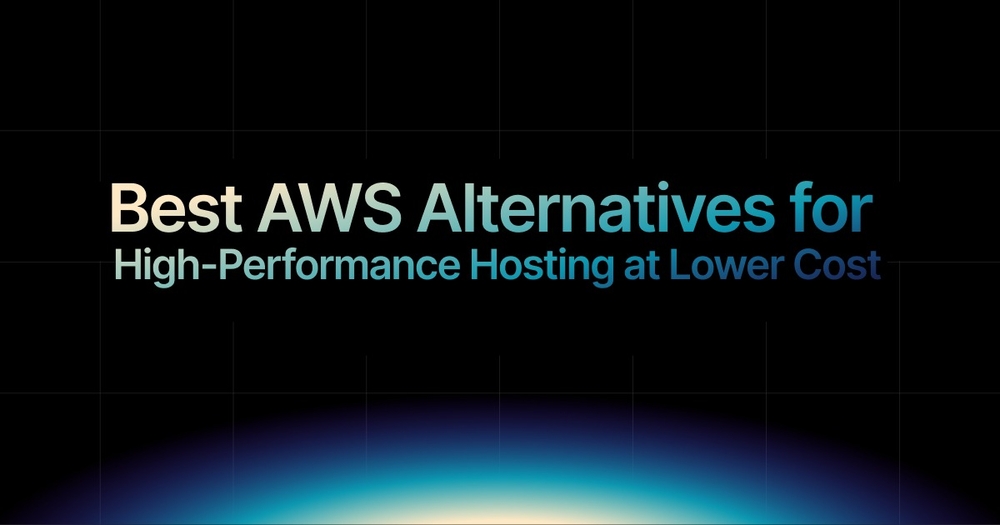
Introduction
When people think of cloud hosting, AWS is usually the first name that comes to mind. It’s powerful, widely adopted, and offers hundreds of services.
But here’s the catch: AWS is also expensive and overly complex for many businesses.
Startups, small to mid-sized businesses, and even growing agencies often don’t need AWS’s full enterprise-scale services.
Yet they end up paying enterprise-scale prices. From unpredictable billing to hidden charges for bandwidth, storage, or snapshots, AWS can quickly become a financial strain.
That’s why so many teams in 2025 are searching for AWS alternatives that deliver the same high performance without the high costs.
And leading the list is Kuberns, a next-gen, AI-powered cloud hosting platform that cuts AWS costs by up to 40% while offering one-click deployments, built-in CI/CD, and automatic scaling.
Alongside Kuberns, there are also other popular providers like DigitalOcean, Vultr, Linode, Hetzner, and Google Cloud/Azure, each with its own pricing and performance benefits.
In this guide, we’ll break down:
- What to look for in an AWS alternative.
- The best alternatives available in 2025.
- Why Kuberns is the smartest choice if you want high performance at a lower cost.
What to Look for in an AWS Alternative?
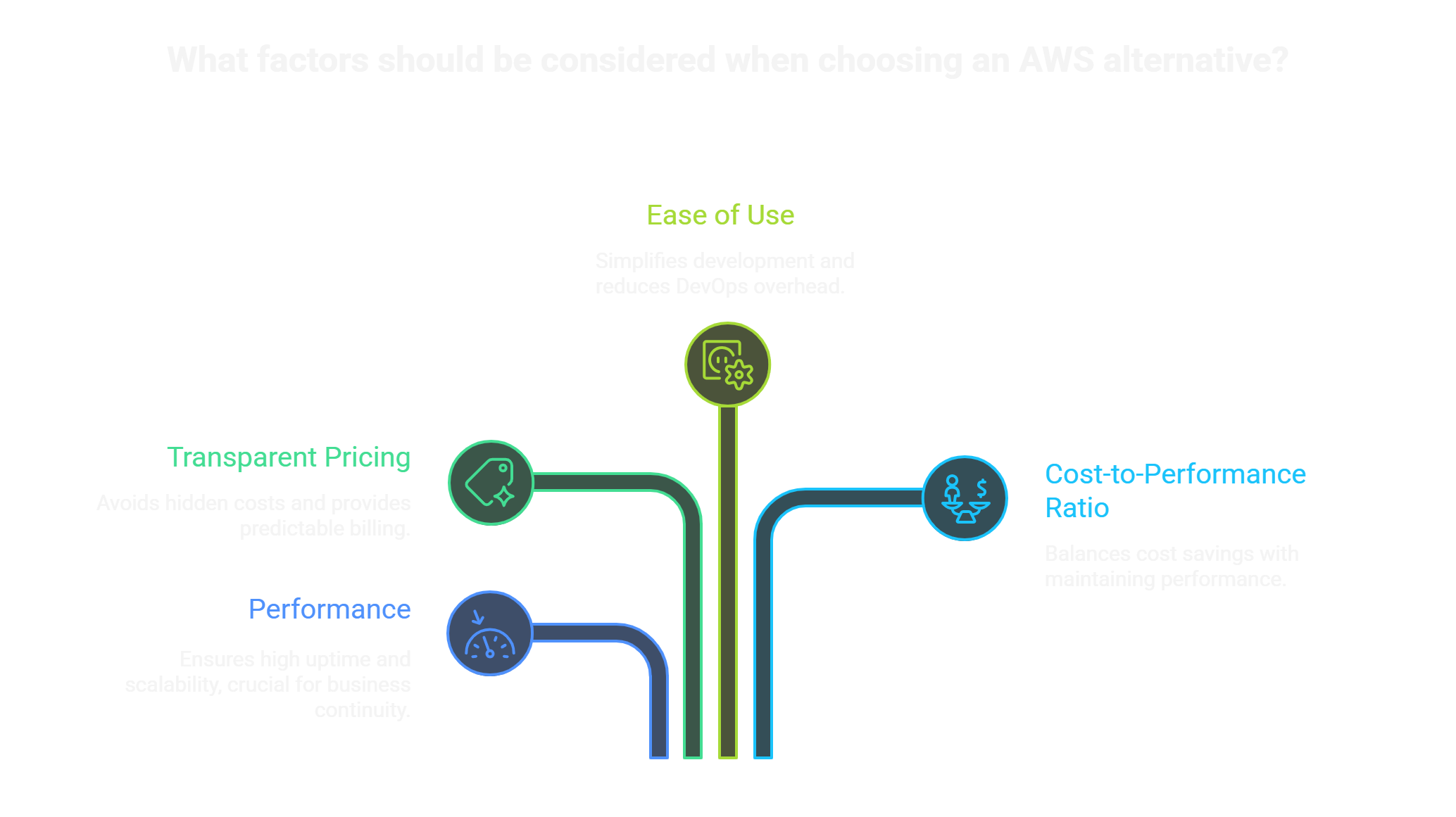 Before jumping into the list of the best AWS alternatives, it’s worth asking: what makes a good AWS alternative in the first place?
Before jumping into the list of the best AWS alternatives, it’s worth asking: what makes a good AWS alternative in the first place?
Many businesses searching for “cheap AWS alternatives” or “best cloud hosting providers in 2025” are not just chasing low prices. They want a balance of performance, transparency, and simplicity.
Here are the key factors to consider:
Performance (Uptime, Speed, Scalability)
Downtime isn’t just a technical issue. It’s a business risk. According to Gartner, the average cost of IT downtime is $5,600 per minute, making high-performance hosting critical. The best AWS alternatives should guarantee 99.9%+ uptime, fast response times, and the ability to scale seamlessly when traffic spikes.
Transparent Pricing
One of the biggest frustrations with AWS is the complex and unpredictable billing. Services like bandwidth, storage, and snapshots often create “hidden costs” that catch teams off guard. That’s why many businesses prefer alternatives that offer flat, transparent pricing models with no surprise charges.
👉 Related reading: AWS EC2 Pricing: Your 2025 Cost Breakdown Guide
Ease of Use (Developer-First Experience)
AWS is powerful, but its learning curve is steep. Alternatives should offer a developer-first experience, intuitive dashboards, easy integrations, and minimal DevOps overhead. As Red Hat’s Gordon Haff said, “Cloud platforms should let developers focus on building apps, not managing infrastructure.”
Cost-to-Performance Ratio
The cheapest cloud provider isn’t always the best. What matters is getting the right balance between cost and performance.
A platform that saves you 40% in infrastructure costs while maintaining speed and uptime is far more valuable than one that simply offers bargain-basement pricing.
When evaluating AWS alternatives, the goal should be to find high-performance hosting at a lower cost, with transparent pricing and simplicity built-in.
Best AWS Alternatives in 2025
If you’re comparing AWS competitors or searching for affordable cloud hosting alternatives, the options in 2025 are plentiful. But which ones give you the best balance of cost, reliability, and performance?
Let’s break down the top choices, starting with the next-generation option.
1. Kuberns: Smarter AWS Alternative with Built-In Cost Savings
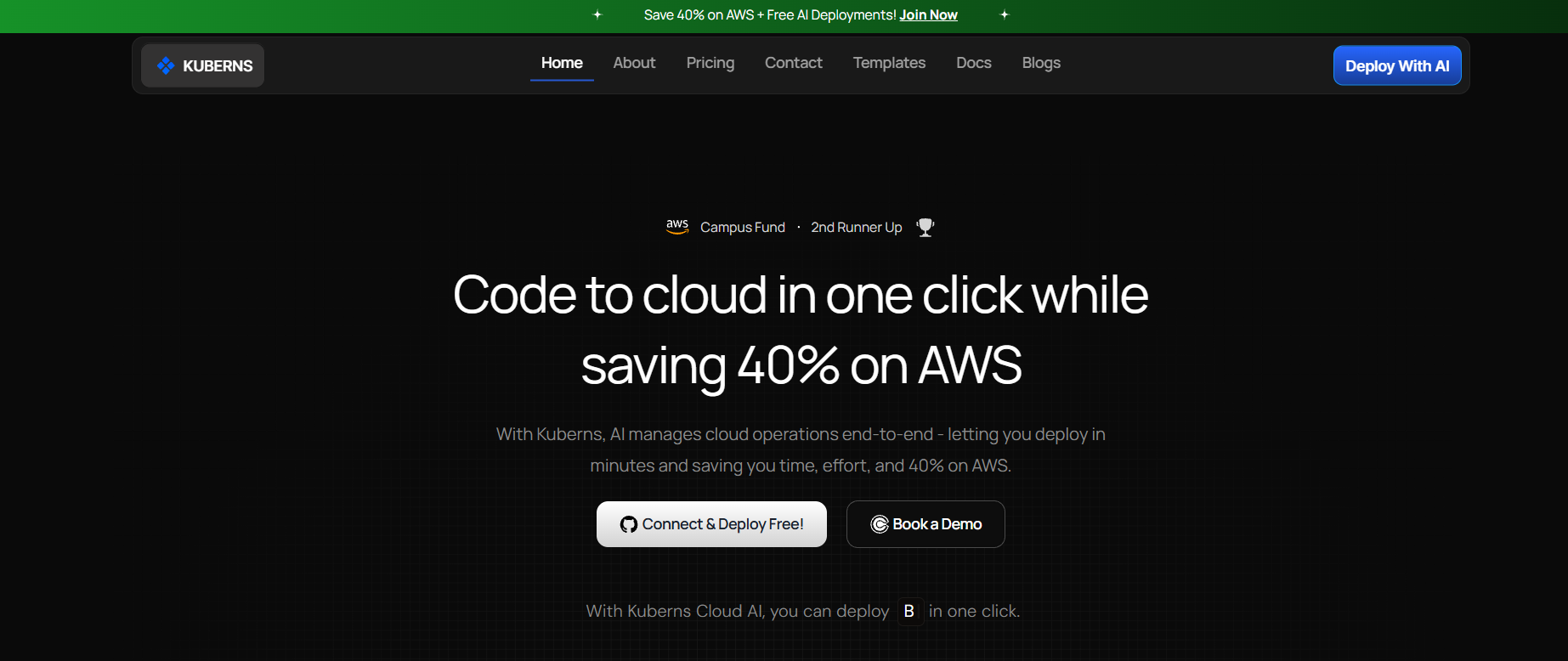 Kuberns is designed as a modern alternative to AWS cloud hosting. Instead of juggling dozens of AWS services and worrying about unpredictable bills, Kuberns offers a simplified, AI-powered platform hosted on AWS infrastructure, but optimised to cut costs.
Kuberns is designed as a modern alternative to AWS cloud hosting. Instead of juggling dozens of AWS services and worrying about unpredictable bills, Kuberns offers a simplified, AI-powered platform hosted on AWS infrastructure, but optimised to cut costs.
Why Kuberns is different:
- Up to 40% AWS cost savings through optimised infrastructure.
- High-performance hosting with automatic scaling built in.
- Transparent pricing, no hidden fees for storage, bandwidth, or monitoring.
- Full-stack cloud environment ready for startups, SMBs, and agencies.
For businesses that want enterprise-grade hosting at a lower cost, Kuberns is often the best alternative.
Related Reading:
2. DigitalOcean: Transparent and Developer-Friendly
 DigitalOcean remains one of the strongest AWS alternatives for SMBs and developers.
DigitalOcean remains one of the strongest AWS alternatives for SMBs and developers.
It is known for:
- Simple pricing plans starting as low as $5/month.
- Droplets (VMs) for quick cloud instances.
- High uptime and reliable performance for small to mid-sized apps.
Its strength is predictability. Unlike AWS, you always know what you’ll pay. But compared to Kuberns, you’ll still need to manage scaling and monitoring yourself.
Also Read: Best Cloud Platform: DigitalOcean vs AWS
3. Vultr: Affordable Global Cloud Hosting
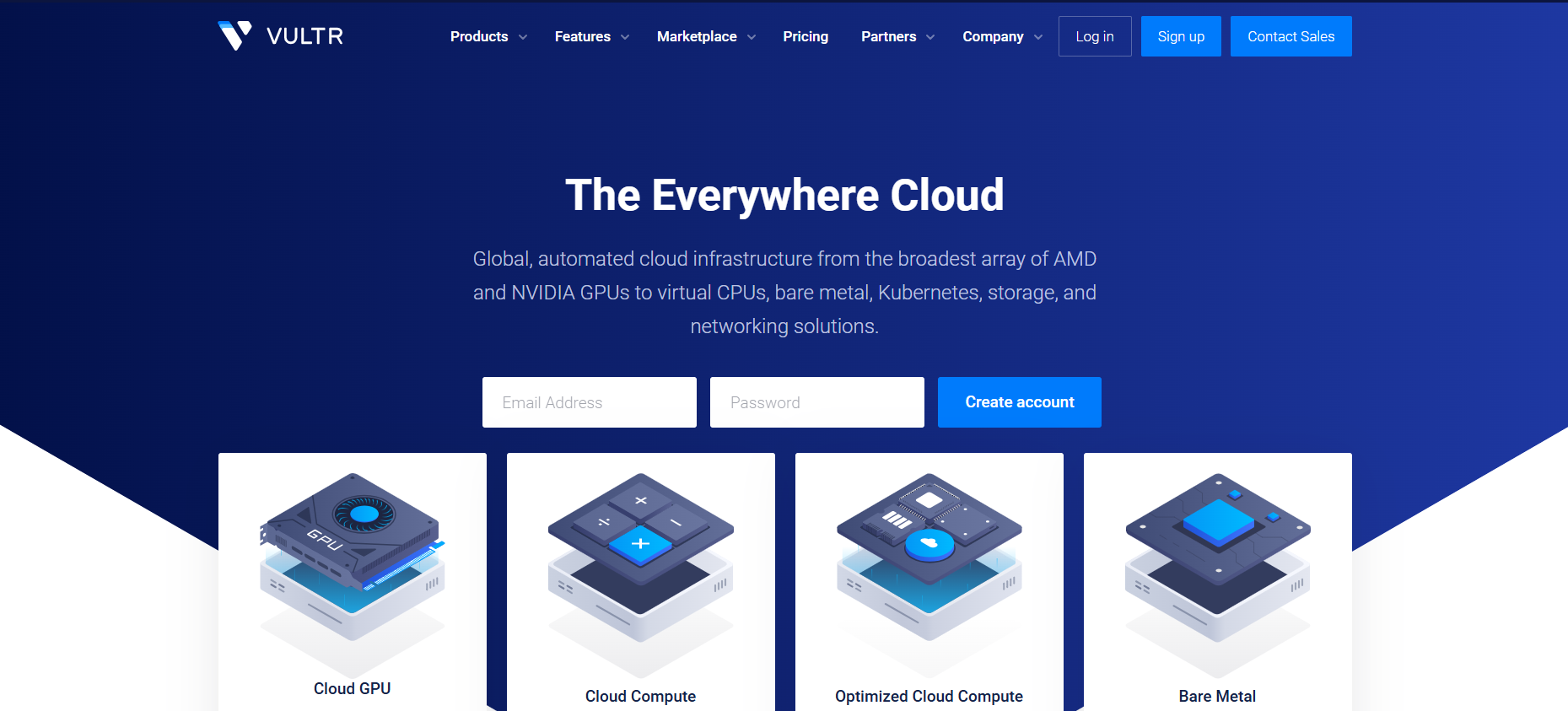 Vultr is popular among developers and small businesses looking for low-cost hosting with worldwide coverage. Its key strengths are:
Vultr is popular among developers and small businesses looking for low-cost hosting with worldwide coverage. Its key strengths are:
- 30+ global data centres for low-latency hosting.
- Competitive pricing (starting at $2.50/month for basic instances).
- Bare-metal servers for higher-performance workloads.
Vultr is cheaper than AWS, but it still leaves scaling, monitoring, and infrastructure management to the user.
Read this: Best Vultr Alternatives in 2025
4. Linode (Akamai Cloud): Predictable Cloud Hosting
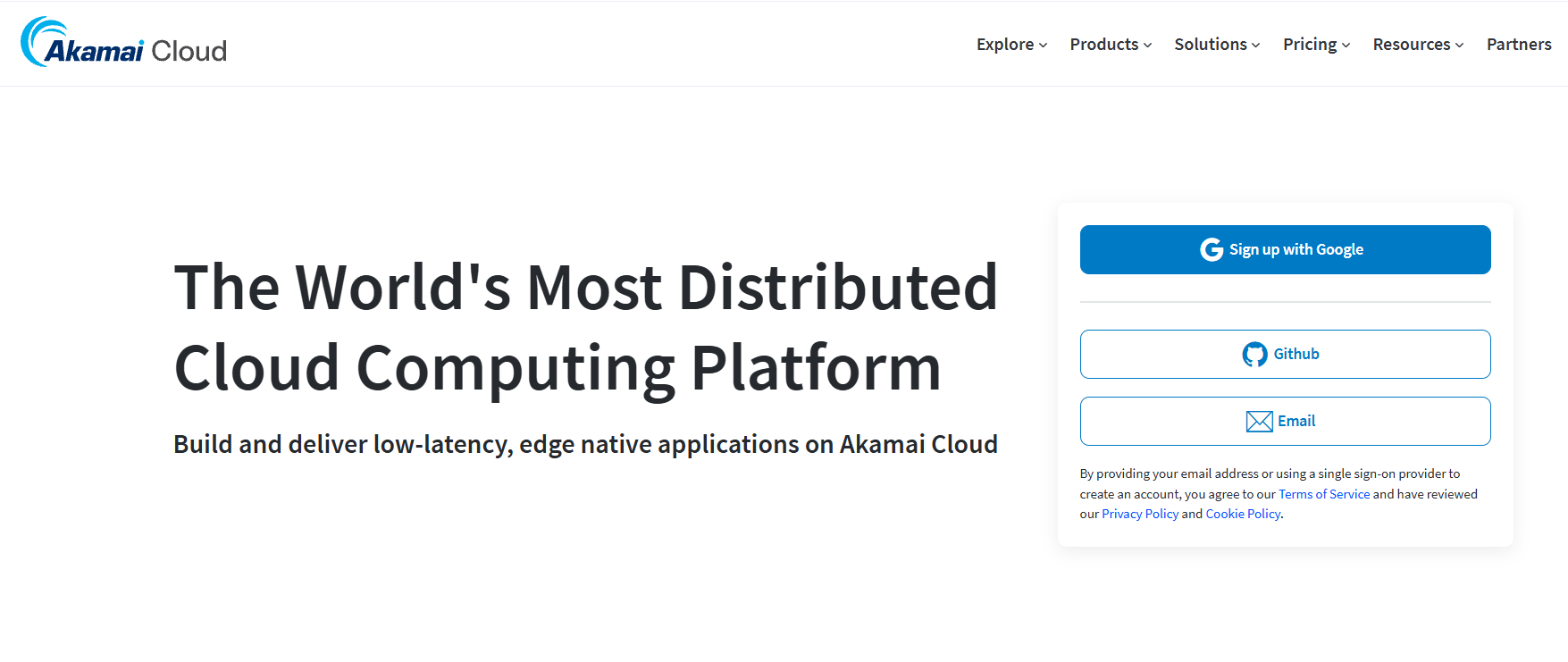 Linode, now under Akamai, is a strong AWS competitor for teams that value predictability and developer-first features.
Linode, now under Akamai, is a strong AWS competitor for teams that value predictability and developer-first features.
- Flat-rate monthly pricing with no surprise bills.
- Good performance for small-to-medium workloads.
- Community-focused support and a simpler interface than AWS.
It’s a safe AWS alternative for developers who want cost-effective cloud hosting without complexity.
5. Hetzner: Budget-Friendly European Cloud Provider
 Hetzner is widely known as one of the most affordable cloud hosting alternatives.
Hetzner is widely known as one of the most affordable cloud hosting alternatives.
- Pricing is significantly cheaper than AWS (basic VMs starting under €4/month).
- Strong performance benchmarks for compute and storage.
- Data centres based in Germany and Finland, making it a good choice for EU-based businesses.
The downside: less global coverage compared to AWS or Vultr, and limited enterprise-level features.
Check this now: Best Hetzner Alternatives for businesses
Among these options, DigitalOcean, Vultr, Linode, and Hetzner deliver affordable hosting, and GCP/Azure compete at the enterprise level. But Kuberns stands out as the only AWS alternative that combines cost savings, high performance, and simplicity without extra DevOps overhead.
Why Traditional Alternatives Still Fall Short?
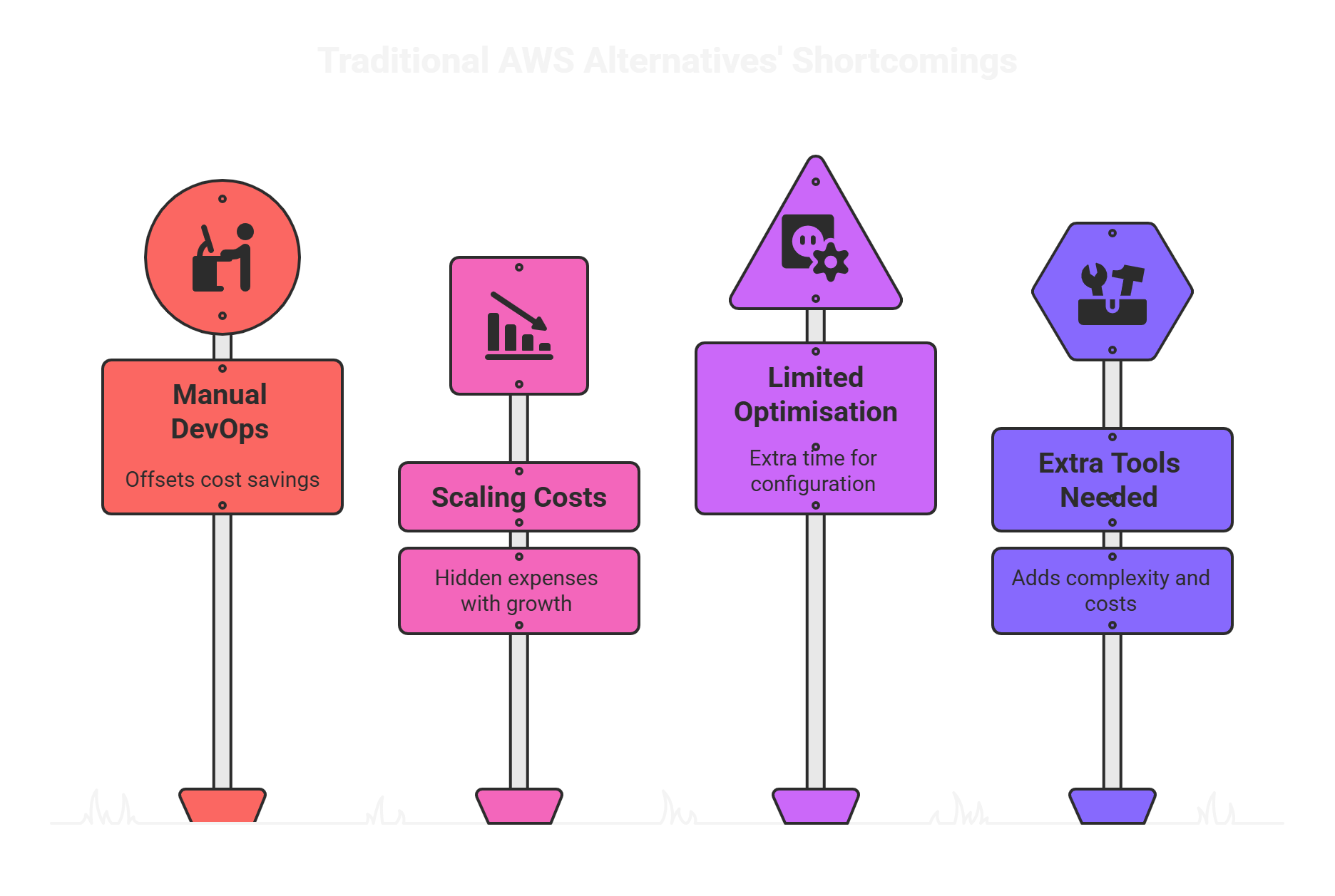 At first glance, platforms like DigitalOcean, Vultr, Linode, and Hetzner look like perfect replacements for AWS.
At first glance, platforms like DigitalOcean, Vultr, Linode, and Hetzner look like perfect replacements for AWS.
They’re cheaper, easier to use, and offer straightforward pricing. But when you look closer, you’ll see they still leave some gaps that businesses need to account for.
Here are the biggest drawbacks of traditional AWS alternatives:
Manual DevOps Work Still Required
Even though these providers offer cheaper infrastructure, you’re still responsible for setting up scaling rules, configuring monitoring, and managing deployments. For many startups and SMBs, this means hiring DevOps engineers, which can quickly offset the cost savings.
Costs Still Grow With Scale
While providers like Hetzner or Vultr are cheaper per server than AWS, costs can rise sharply as your app scales. Unlike AI-driven optimisation, most traditional providers won’t automatically adjust resources to reduce waste. You save at the start, but growth often brings hidden expenses.
👉 Related reading: How to Reduce AWS Cost
Limited Performance Optimisation
Many lower-cost cloud hosts don’t include built-in performance tuning. Developers often need to spend extra time configuring caching, load balancing, and auto-scaling to maintain high performance under heavy traffic.
Extra Tools for Full-Stack Hosting
If you need CI/CD pipelines, observability, or cost monitoring, you’ll have to integrate third-party tools. This adds complexity and, in many cases, extra monthly costs.
While traditional providers are solid for basic infrastructure, they don’t fully solve the cost-efficiency and simplicity problem. That’s where next-gen platforms like Kuberns step in, combining hosting, optimization, and AI-powered automation in one place.
Why Kuberns is a Smarter AWS Alternative for Hosting at Lower Cost?
Most AWS alternatives focus on being cheaper than AWS, but being cheaper alone doesn’t solve the problem. Businesses need high-performance hosting, predictable pricing, and reduced operational overhead.
That’s where Kuberns stands out as a smarter choice.
Here’s why:
1. One-Click GitHub Deployments
With AWS and even other alternatives like DigitalOcean, setting up environments takes time and expertise. Kuberns removes the friction. Developers push code, and the app is live in one click. This cuts down setup time and costs significantly for startups and SMBs.
2. Built-In CI/CD at No Extra Cost
Instead of paying separately for CI/CD tools or writing complex pipeline configs, Kuberns has continuous integration and delivery built into the platform. That means you save both infrastructure spend and engineering hours.
Read This: AI for DevOps: The Secret to Faster, Smarter Software Delivery
3. AI-Driven Scaling and Monitoring
Traditional AWS competitors leave scaling rules up to you. Kuberns uses AI to automatically scale resources based on real-time demand and continuously monitor app health. The result: better performance with less wasted infrastructure spend.
4. Up to 40% AWS Cost Savings
Because Kuberns runs on optimised AWS infrastructure, you get the same reliability but at up to 40% lower cost. This makes it ideal for teams that want enterprise-grade hosting at startup-friendly prices.
Related Reading: Cut Cloud Costs with AI in DevOps
5. Transparent Pricing (No Surprise Bills)
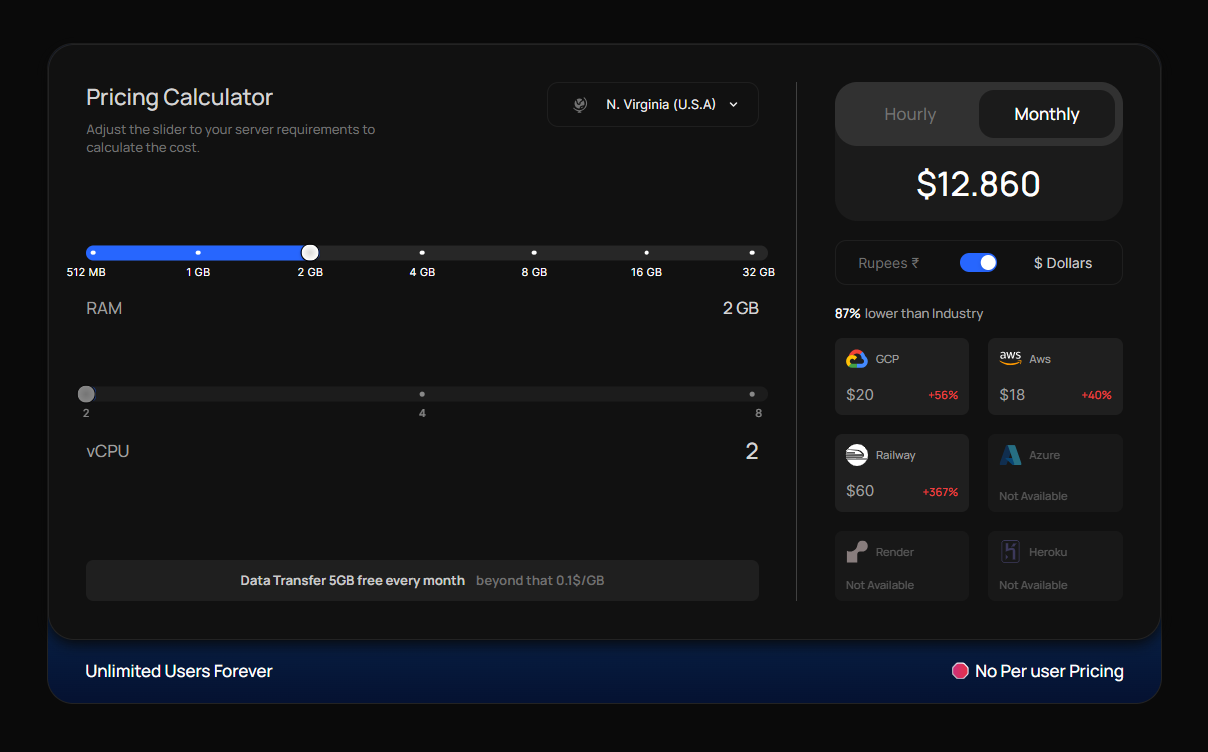 Unlike AWS’s complicated billing (with charges for bandwidth, snapshots, monitoring, etc.), Kuberns keeps things simple with predictable, all-inclusive pricing. No hidden fees, no surprise spikes.
Unlike AWS’s complicated billing (with charges for bandwidth, snapshots, monitoring, etc.), Kuberns keeps things simple with predictable, all-inclusive pricing. No hidden fees, no surprise spikes.
In short, Kuberns combines what businesses look for in an AWS alternative: lower cost, strong performance, and zero hassle.
Who Should Choose Kuberns Over AWS?
 When businesses look for AWS alternatives, the question isn’t just about price. It’s about fit.
When businesses look for AWS alternatives, the question isn’t just about price. It’s about fit.
AWS is built for enterprises with complex needs, but most startups, SMBs, agencies, and independent developers don’t need that level of complexity (or expense).
Here’s who benefits the most from choosing Kuberns over AWS:
1. Startups- Lower Burn, Faster Iteration
Startups live and die by speed and cost efficiency. AWS often forces young teams to overpay for infrastructure they don’t fully use.
- With Kuberns, startups cut cloud spend by up to 40%.
- One-click deployment means teams can ship features faster without waiting for DevOps support.
- Transparent pricing helps founders predict their burn rate accurately.
2. SMBs- Predictable Monthly Costs
Small and mid-sized businesses don’t have the luxury of massive budgets or DevOps teams. AWS billing complexity makes planning hard.
- Kuberns provides all-in-one hosting with no surprise charges.
- Built-in CI/CD and monitoring save SMBs the hassle of buying and maintaining extra tools.
- This means IT budgets can finally be spent on growth instead of overhead.
3. Agencies- Manage Multiple Projects Without Overhead
Agencies often juggle multiple client projects and can’t afford to spend hours setting up AWS environments for each one.
- With Kuberns, agencies can deploy client projects in minutes.
- Scaling and monitoring are handled automatically, so teams don’t need to babysit infrastructure.
- The result: more time spent delivering client value, less time fighting cloud bills.
4. Freelancers & Independent Developers- Focus on Code, Not Infrastructure
Freelancers need to impress clients with working apps, not complex AWS setups.
- Kuberns lets them launch projects quickly, without learning the ins and outs of AWS.
- Predictable costs mean freelancers can quote clients confidently without unexpected hosting fees.
- It’s the simplest way to run production-ready apps without heavy DevOps knowledge.
Whether you’re running a fast-moving startup, a lean SMB, an agency managing multiple projects, or a freelancer building client apps, Kuberns is the AWS alternative that gives you performance without the AWS price tag or complexity.
Final Verdict: Try the Best AWS Alternatives at Lower Cost
AWS is still the global leader in cloud hosting, but it comes with enterprise-level costs and complexity that most businesses don’t need.
That’s why so many developers, startups, SMBs, and agencies are actively looking for AWS alternatives in 2025.
- DigitalOcean, Vultr, Linode, and Hetzner all deliver cheaper cloud hosting with decent performance.
- Google Cloud and Azure compete at the enterprise level with different pricing models.
- But these options still leave gaps: manual DevOps work, scaling setup, and unpredictable costs as apps grow.
That’s where Kuberns comes in as the smarter AWS alternative.
It combines the reliability of AWS infrastructure with built-in cost savings (up to 40%), AI-driven scaling, one-click deployments, and transparent pricing, making high-performance hosting simple and affordable.
If you want the power of AWS without the AWS price tag or complexity, Kuberns is the alternative you’ve been waiting for.
Start Saving on Cloud Hosting with Kuberns

FAQs on AWS Alternatives
1. Which AWS alternative is the cheapest?
If you’re looking for the cheapest AWS alternatives, and cost savings plus automation, Kuberns offers up to 40% lower AWS costs with built-in scaling and monitoring.
2. Is AWS worth the price in 2025?
AWS is worth the price for enterprises that need complex infrastructure at a global scale. But for startups, SMBs, and agencies, AWS is often overkill. Many teams switch to AWS alternatives like Kuberns to get affordable cloud hosting with high performance.
3. What is the best AWS alternative for startups?
Startups typically value speed, affordability, and simplicity. While DigitalOcean and Vultr are popular, Kuberns is a stronger choice because it offers one-click deployments, built-in CI/CD, and AI-driven cost optimisation, all at a fraction of AWS costs.
4. Do AWS alternatives offer the same performance?
Yes, many AWS competitors provide 99.9%+ uptime and fast response times. Kuberns stands out by combining AWS-grade reliability with AI-based optimisation, making performance more cost-efficient.
5. Why are businesses moving away from AWS?
The main reasons are cost, complexity, and hidden charges. AWS pricing is often unpredictable, with extra fees for storage, bandwidth, and monitoring. Alternatives like Kuberns, DigitalOcean, and Hetzner attract businesses that want transparent pricing and predictable monthly bills without losing performance.